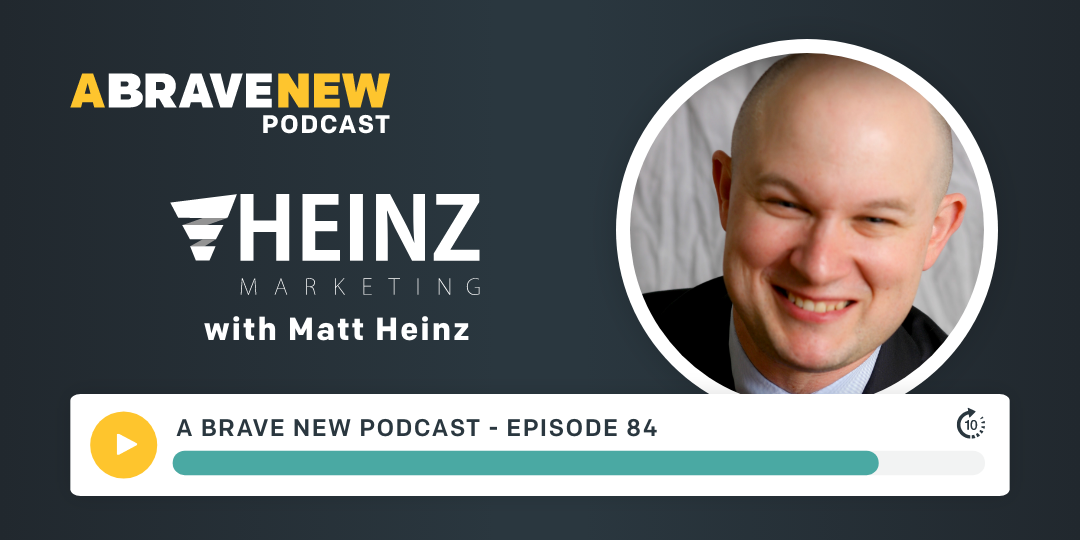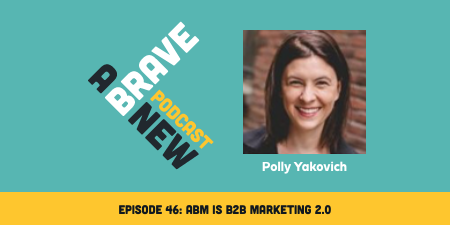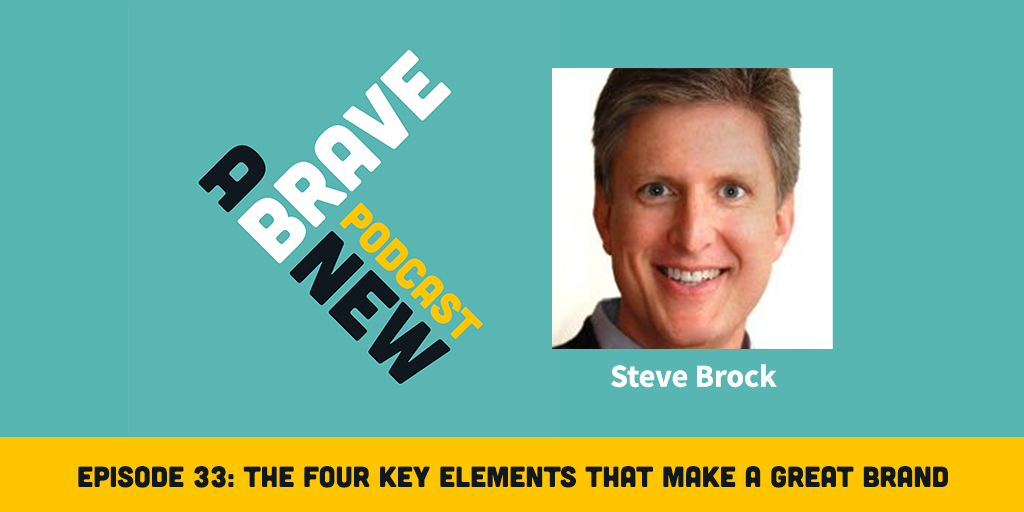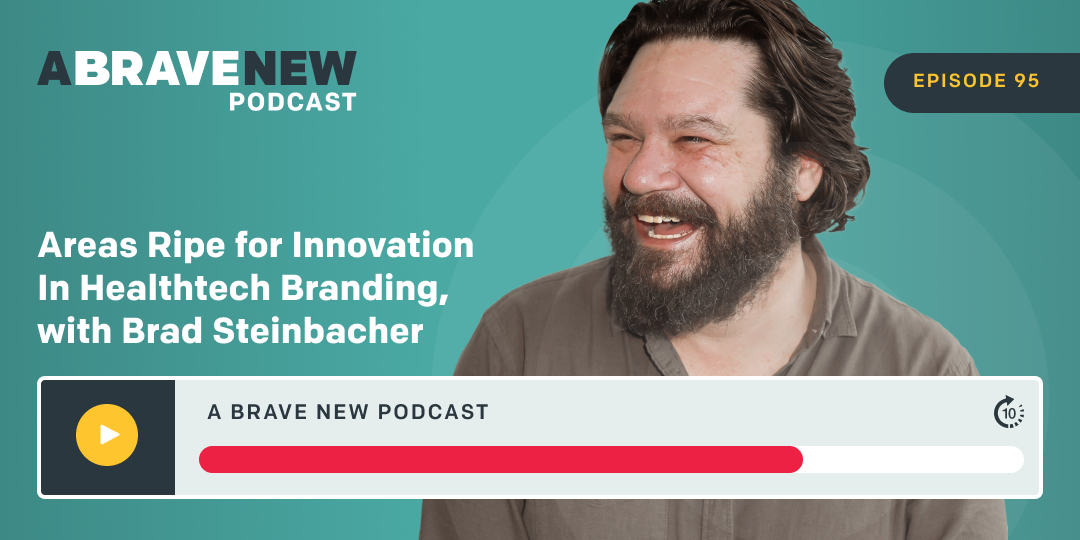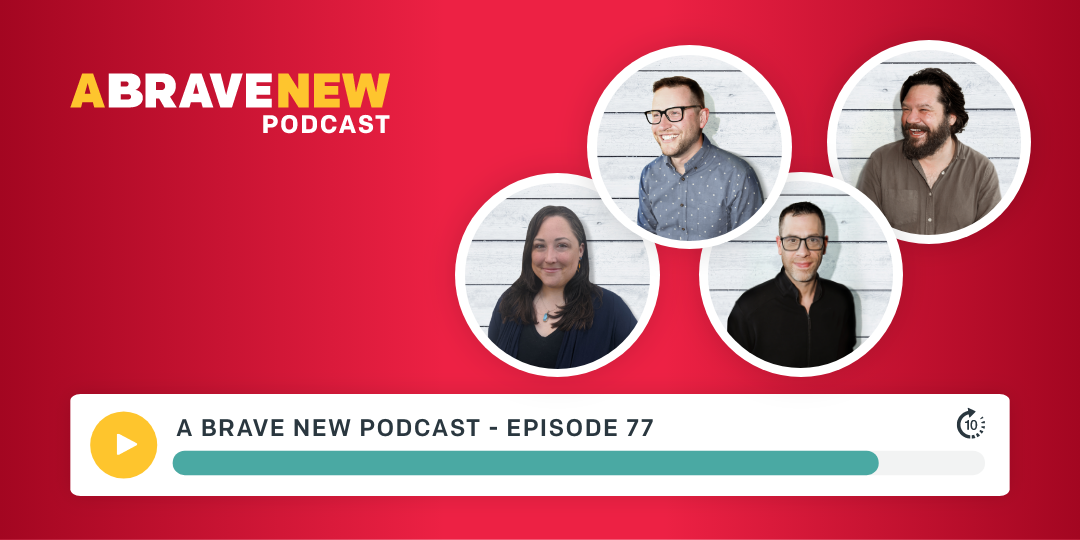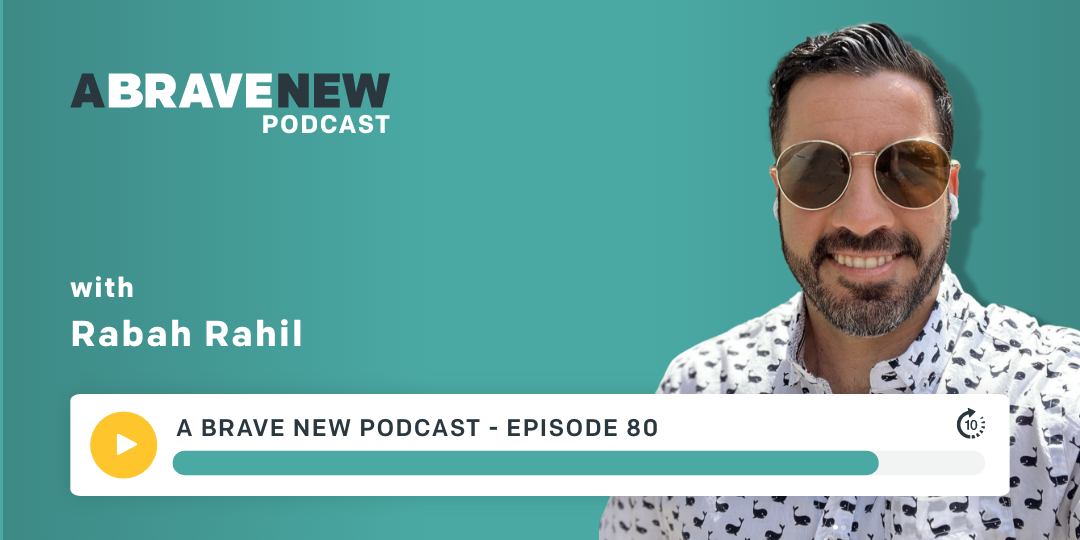Josh Dougherty is a brand strategist, speaker, and the founder and CEO of A Brave New, a Seattle-based B2B digital marketing agency specializing in tech and healthcare. Over the last decade plus, he’s worked with clients to develop unique brands and accelerate business growth using web design, inbound marketing, and account-based marketing strategies.
What you’ll learn about in this episode
- About the current macro trends around trust and uncertainty uncovered by Edelman’s annual online survey of over 32,000 people in 28 countries
- The opportunities that B2B healthcare and technology brands have to stand out in the midst of an environment of distrust, uncertainty, and polarization
- Why now is the time for businesses to take a position of leadership in society and in the way they engage with their prospects (in a way that matches their brand, of course)
- Specific strategies to build your brand in this environment including
- Giving voice to the scientists if you work in the healthcare and technology spaces
- Investing in making a societal impact and speaking up for values
- Exploring government collaboration where appropriate to make the world a better place
- Speaking up and taking concrete action about issues people care about (especially CEOs)
- Investing in the platforms that people trust most
- Being someone who provides trustworthy and accurate information
Additional resources
- 2023 Edelman Trust Barometer
- Josh Dougherty on LinkedIn
- Josh Dougherty’s Public Speaking Site
- A Brave New’s Website
Transcript
Hello and welcome to the show today. If you've been listening to this podcast for any amount of time, you know that what we're trying to do here is to really understand the building blocks of making a memorable brand. Specifically, we look at that through the lens of the B2B healthcare and technology spaces. During our conversations and during the work that I've done building brands over the last many years, we understand that doing this successfully, building a memorable brand, a brand that's going to stand out, that people are going to recognize, alway, requires a combination of two things.
First, it requires knowing who you are deep down and knowing how to express that clearly. Then second, it requires meeting people where they're at. That's why I'm really excited about today's show. Now, often we have a series of guests on the podcast, but every once in a while I'd like to spend some time just you and me talking about brand and the impacts that we can have if we're doing our work right. And today, we're going to do that by examining one of my favorite reports. It's called the Edelman Trust Barometer.
This is a bit of research that has been conducted every year for 23 years. It's conducted as an online survey and it's pretty broad in scope. You see, 32,000 people respond to it each year in over 28 countries. Usually, there's around at least 1,150 respondents per country. So if you're looking for quantitative data that helps us understand the state of trust, how people perceive governments, NGOs, businesses, this is one of the best ways to do that. That's why I think it's relevant to your efforts to build a memorable brand.
It gives us one of the best pieces of quantitative data about macro trends that you're facing in the market, that all of us are facing in the market as brand builders. When we can overlay that with the specific knowledge about how to market to the healthcare and tech markets and how to show up as a brand in those markets, it can give us some really solid insight about how to go about solidifying the position of your brand and building more differentiation.
So I want to dive into a bunch of details about this report, but first, I wanted to provide a summary of kind of the macro feel behind this report. If you haven't read it yet, I'll also link to the report in the show notes so that you can go ahead and grab it. It's worth perusing and spending some time thinking about it. Now, the 2023 report, just like in 2021 and 2022, highlights a few things that probably won't surprise you at all. First, there's this idea of uncertainty. People don't know what the future looks like. They aren't sure if it's going to look good. In fact, they're quite pessimistic about it.
One of the key things that came out in this report was that for the first time, the majority of people don't think that life will be better in five years financially, specifically for them, than it is now. There's also a huge lack of trust globally. Again, no surprise. Then the final piece is that polarization has never been worse. Again, no surprise. So we won't be all doom and gloom, but I think it's important to understand these are the key findings. This is part and parcel to the fact that if we're going to meet people where they're at, we have to understand kind of the situation that we're all living in.
In the U.S. especially, this distrust is driven by increased polarization. Edelman in the report characterizes the U.S., and I shouldn't say Edelman, but the survey respondents from the U.S. characterize the U.S. as a severely polarized nation. That means that there seem to be fundamental polarization drivers that people aren't sure can be overcome. This is understandable, right? We've seen things over the last few years that have driven that, from differences in opinion, really radical income inequality, a number of different things that drive us to all feel uncertain that we can trust everyone around us, and we've seen this reflected in our political system.
In addition, there is a strong fear of economic uncertainty. People don't know whether the future will be better for them, even as we're trying to look and understand what does 2023 mean for us from a business perspective with inflation, with an uncertain economy, all those things. This is all understandable, right? We've seen over the last years many things that would drive these feelings from inflation, the war in Ukraine, continued divisive politics, I think still suffering from the long tail of the pandemic.
So on a macro level, it seems like it's pretty challenging out there. How do we build trust for our brands? But well, my main focus here is a little more bright, I think. I don't want to just get caught in tkind of the dark side of this report, but I want to dive past this macro finding and more into the data. The thing I see is there is a significant opportunity for healthcare and technology brands to build a position of trust in their target markets and in society as a whole. Let me explain why.
One of the findings from the report is about how much different industries are trusted. Now, it might surprise you, but technology and healthcare are two of the most trusted industries. 75% of people said they trusted technology firms and 70% said healthcare. The only other industries that match up with that are really education and food and beverage. So we're in a pretty good place of trust. If you look at privately held firms, these are the firms that I talk to and work with the most, they have a significant trust advantage over publicly held firms.
In addition to this, businesses according to this report are the only entities seen as ethical and trustworthy. They're not governments, not the media, not NGOs, but businesses are the only ones who are seen as ethical and trustworthy. Now, this is the same as the last two years of the report, and this is a substantial opportunity. It allows us as businesses to stake a position of trust, a position of strength as we're working and as we're trying to build trust with our audiences.
That also comes with a risk, right? Because when you're the only one who is seen as ethical and trustworthy, it becomes that people are going to judge you a little more harshly, right? Now, all this gives me hope that there's opportunity here, right? Healthcare and technology are trusted, privately held firms are trusted, businesses are seen as ethical and trustworthy, and there's more to it. The final piece here is that people are looking for companies and CEOs to take the lead in advocating and creating a better world.
So combine these four things together. What does that mean for you? I think it means a few things. First, if you spend time thinking deeply about that unique memory and the values at the center of your brand, you have an opportunity. Because if you understand the things that make you unique and are uniquely you as a company and you know how you want to show up, there's a space here for you to advocate and align yourselves with the bigger societal issues that align with your core values. People are going to trust you as you do it because you're in trustworthy industries.
If you can focus on pushing those things forward, you'll be able to build further trust with your prospects and your customers. Because after all, the people who work and make buying decisions to come work with you, who follow you, who buy into your brand are people after all. So if we can appeal to these larger things and align ourselves with the larger trends that are happening and use our authentic identity, that unique essence at the core of our brand, those unique brand values to express how we're going to help make the world better, we have an opportunity to build trust. In addition to that, you have an opportunity to build trust with your employees too.
Putting yourself in a position of trust is going to increase your ability to make a difference as you try to achieve your mission as an organization. Because at the end of the day, every brand is built on trust, right? We talk a lot about how a brand exists as a memory in the mind of our customers. If people don't trust that memory, it's going to be hard to have any traction, it's hard to be remembered. It's going to be hard to stand out, and it's going to be hard to get people to work with you.
But if we can show up in a unique way right in this societal moment, help to push the world forward, help to make things a little more certain, a little more trustworthy, and be trusted as someone who can do that, we're going to be able to continue to build that group of followers, the people that are interested in what we do, and we're going to be able to grow our businesses. So on a whole, macro wise, things look pretty bleak, but in every somewhat dark moment, there's an area of opportunity.
Especially if you're a branding or a marketing leader in a healthcare or technology company, if you can show up in an authentic way and encourage your C-suite to show up in an authentic way, make a big difference, I think you'll be able to come out and leverage this moment to build greater brand equity and to hopefully make a real impact in the world as well.
So let's shift now and look at some of the specifics in here. So if we understand this big macro opportunity that exists in front of us, I want to talk about some of the specifics, the specifics to how you can leverage the assets that you have in your organization to build trust and hopefully make a bigger difference. Let's talk about healthcare firms first. One specific opportunity that they have is to feature their scientists. For the third year running, scientists in this report are perceived as the most trustworthy people. So people don't want to hear from CEOs as much as them. They don't want to hear from spokespeople. They want to hear from scientists.
They trust scientists more than their coworkers, more than their CEO. So healthcare firms I think should be bold in featuring those scientists and letting them speak, whether they're researchers in a biotech like some of our clients that are working in biotechnology or working on vaccine development or working on any number of things, or if they're in more of a traditional healthcare setting, B2B healthcare setting. Maybe they're physicians, chief medical officers often in the organizations we work with who are seeking to build bridges into other organizations, these people when they speak are trusted.
So us allowing them to share their voices, and I should mention, it's not just about sharing their voice, but being able to speak in a trustworthy way. We don't want to give them a talk track, et cetera. We want them to be able to share impartial data to be able to speak the truth, to be able to advocate for what is real. This isn't about a talk track. It's about exposing people to the great science or the great science behind the work that you're doing because they see it as one of the last things that we can truly trust. So that's healthcare firm's opportunities. Let your scientists speak front and center.
The next specific takeaway is it may be time to double down, if you're based in the U.S., to really highlight that. One of the things that the report talks about is this difference between whether someone is trusted in their home market versus if they're in a foreign market. For example, firms based in the U.S. are trusted by 65% of people in the U.S., but as soon as they move outside of the U.S., they're only trusted by 55% of people in those markets. One of the most extreme examples is Indian companies, right? This is where many technology firms are based. But in India, Indian technology companies are trusted by 89% of people. But when they move outside of India, they're only trusted by 34%. This is an inherent barrier to someone who is trying to break into the U.S. market.
But if you're in the US market, and you're a healthcare or technology firm, you have an opportunity to move forward from this position of trust, to know that by highlighting the fact that you are from here and that you're a firm based here, you can get further ahead. Like it or not, this is something that's true of the era that we're living in, right? We're becoming more local, less global.
The one exception here is Canadian firms. So if you're a Canadian technology firm or Canadian healthcare firm listening, you can know that you are very trusted. Well, I should say not just Canadian firms, Canadian, German, Japanese firms are trusted both internationally and within their country. So you can kind of move forward confidently there. But largely, if you can highlight in this market in the United States that you are based here, you're going to build trust.
So, next takeaway is that people expect companies to be investing and making a societal impact and speaking up for their values. So let's unpack that a little bit for what this looks like in a healthcare and technology space and what this looks like specifically in the B2B healthcare and tech space. First, in healthcare, what does it mean to invest in making a societal impact and speak up for your values? I think it means that working within your brand framework and your brand values, you need to find out how to talk about things that people really care about. Things like healthcare access, things like reduced costs, things like giving everyone the care that they need, things like not turning people into a number, not just perpetuating an old system that is not working very well, frankly, for many people in the United States.
Now, you may say these are all about frontline healthcare, right? I'm a B2B healthcare marketer. We provide a service to hospitals. How is this relevant to us? Well, I think you need to think about how does your brand help make these things possible? How does your brand help at the hospital, or whoever you're selling to, in working with patients to get more access? How does it reduce costs? How does it enable healthcare providers to provide the care that everyone needs? How is it transforming a broken system so that it's possible for the system to work for everyone? How are we making people more human?
These are the things I would be thinking about as a healthcare marketer trying to build a brand, a B2B brand that really embodies this. At the end of the day, speaking up for values isn't just something that the company should be doing as a whole, but that people want CEOs to speak up. They want the C-suite to be talking about this. So I think this has to be baked into the messaging and to the core identity of what you're doing as a company and shared not just in your corporate marketing but in the messages that your C-suite and leadership are putting out.
So, if we shift over to technology where it's all about how do we as technology firms invest in making a societal impact, speak up for values, help reduce the polarization? I think you need to be thinking about: In the context of my brand, how do I do the following? How do I advocate for the ethical uses of technology? How do I put in adequate safeguards for new technology? I'm thinking here, especially since ChatGPT came out, right? How do I build safeguards for AI? How do we make sure that we can trust it, that it's going to work?
I think the other thing that technology firms, B2B, B2C, regardless, is we need to work on connecting our work to real world human impact. At the end of the day, people want to know that you're making the world better for people. Your values are about making the world better for people, not just about providing a cool technology piece or technology solution. I think the other thing that's important for these firms is you need to focus on I think not living into the Silicon Valley technology feel. We need to focus on highlighting how does our mission, how do we show up as a brand? How does the way we communicate connect with all people and break down barriers, not further this thought about a coastal technology elite that isn't connected to the real world?
So that's a little bit about how we as technology and healthcare firms can invest in making a societal impact and speak up for values. Now, the one other thing I'd say about this before I move on to the next point is it can't just be about speaking up. We're in an era of authenticity where people see through speech that doesn't actually ... They see through speech that isn't actually followed by action. So if you are going to be talking on working on these types of things, you need to be able to back it up with action. People expect your mission to be about bettering the world, and they expect it to be spoken about, but also acted on. So think about how you're going to do that.
Now, I would bet for most of you, you already have a real massive impact that you're making in the world, but you haven't thought about it in that way, maybe. So I'm thinking about a firm that I work with that is a technology firm that does tech consulting. They're all out, we're just shifting applications. Well, what is the real world implication of shifting applications from on-prem into the cloud? How does that help people? How does it allow organizations to make a greater impact if their data can be processed faster? If their data can be processed more efficiently, what can they do with that? I think you need to ask those questions to get to the core of what is the way that you can be making more of a societal impact?
Great. So now let's talk about the next finding that I think is really relevant. That's for healthcare firms especially, maybe health tech as well. But the survey asked people what are issues that they think business is not doing enough to address? Two of those issues were healthcare access and providing trustworthy information. So if you're a healthcare or health tech company that's focused on making the world a better place, achieving your mission, I think you need to think about: Does what we do help improve healthcare access, and can we provide more trustworthy information?
If there's any way that you can be talking about these things, be highlighting, and even be doing more around them, this is something that I would recommend doing because it's going to help you connect with people and it's filling a real void in our society, right? So I'd encourage you to think through, does our solution deal with healthcare access? I am not saying here, to be very careful, that you should be talking about healthcare access if what you do has nothing to do with that, then this just doesn't apply to you. But if you are in some way addressing healthcare access, speak to it.
Now, of course, the providing trustworthy information piece is relevant to anyone, not just in healthcare, but also in technology and in many other areas. So you should double down on that no matter what. Now, let's shift over to talk a little bit about the CEO, the key leader in an organization. CEOs are expected today to speak out, to advocate for things, to be people who are making an impact, not just in how they speak but also in what they do and how they show up.
So there's a few things that people really want CEOs to take a public stand on. So you need to think about how does our CEO do this from an authentic place of who they are and from an authentic place in your brand. You need to think about how does a CEO make a public stand on four key issues I think are most important. One, treatment of employees. This is the most important issue to people that they expect CEOs to be speaking on. Are you taking good of care of your employees? Are you taking a public stand for employees getting what they deserve and being treated well?
Next is climate change. People want to know how CEOs view climate change and how they're approaching that in their business. Third, they want CEOs to speak out against discrimination and take a public stand on that. Fourth, on the wealth gap, the difference between those who are super wealthy and those who are lower income. Now, all these things, public stands as I'm talking about this, I want to emphasize, require action too. Otherwise, the whole thing unravels really quickly.
So as you think about how to encourage your CEO or if you are a CEO, how you are going to take a public stand within the context of your brand on the treatment of employees, climate change, discrimination, wealth gap, you need to think about not just how are you going to talk about it but what actions are going to follow as a result. Three more quick pieces to talk about before we wrap up. First, collaboration with government is seen as a hugely positive thing. So if you're in a space where you can do that, consider exploring some sort of collaboration that's going to help improve things, help make the world a better place.
Next, I think be careful about thinking about the platforms that you should focus on as you're trying to build trust with your brand. People trust two platforms most, that's search and traditional media. So I have a long history working in content marketing, have a long history doing inbound. I'm all about your own media, but your own media strategy, your own strategy of building great content on your website has to have a search component so that a search engine is going to serve that content up.
It should have a PR element so you're getting spoken about in traditional media to build your brand because those are the things that are going to build trust. You cannot have a social media only strategy because people just don't trust social media today. Now, that doesn't mean that you can't be on social media. You probably need to be on social media, but it can't be your only approach. You need to be on the platforms that people trust, in that search and traditional media. You need to have your own media, stuff like your content on your website, et cetera. But again, that's not enough. Then you need to really, really, really be focused on trustworthy information when you're in social media so that you aren't lumped in with the rest of the misinformation that happens there.
Then finally, there's things that you must combat as an organization. There is a lot of global concern about bad science being spread, about unethical tech platforms. So as a company, you need to think about how do we expose or make sure that we're highlighting when something is wrong and we're not going to put up with it. Then finally, you need to think about not advertising on unethical platforms. These are things that people care about. I think that last one is especially hard, right?
Well, they're both kind of fraught with some risk, right? We need to understand from our perspective as a company, how we show up in the world from our brand, the essence that we have, the values that we have. How do you expose bad science and misinformation in a way that is true to you, that will reflect your values as an organization, that just doesn't seem negative? Then on the advertising side, many people rely on platforms like Facebook to get their message across. But many people view that as a misinformation platform.
So we need to wrestle with, does that allow me to continue to advertise on a platform like Facebook? Or do I have to not do that because I'm trying to take a higher road? I think that's going to be a different answer for everyone, but it's something that needs to be thought through and struggled with. So those are some of the takeaways. I really wanted to conclude by talking about the bottom line.
I want to share Edelman's bottom line for businesses, what they said was the most helpful or the four things that they could do to navigate a polarized world. Then I have a bottom line as well. So, Edelman closed their report by saying there are four ways that businesses can navigate a polarized world. First, they need to continue to lead. They need to inform the debate, deliver solutions that are going to address climate, diversity, inclusion, skill training. They need to take the mantle of great expectation that people have to be ethical and trustworthy leaders. Second, they should collaborate with the government. Third, they need to work to restore economic optimism. Fourth, they need to be an advocate for truth.
So this is their recipe. Lead on important issues, collaborate with the government, restore economic optimism, and advocate for the truth. My bottom line is similar, but I think for healthcare and technology brands that are seeking to be bold, be brave, be remembered, they need to do a couple things. First, they need to get a really firm idea of who they are. Who are you at the core? How does that change how you show up in the world? What's the unique memory at the center of your brand? What's the essence? What are the values built around that unique memory? How do you want to convey that?
Second, you need to be consistent in conveying that message to the world. Third, this is the only way, by having that firm knowledge and that consistency, this is the only way that you can meet people where they're at without just changing your message every year. Then when you know that unique memory, those values of the center of the brand, when you're consistent about conveying it, you're able to meet people where they're at and speak authentically for the truth. You're able to speak out about misinformation from a place of centeredness. You're able to remember that everyone you sell to is a human. This is going to allow you to be part of the solution. At the end of the day, it's going to allow you to build trust, which is at the core of every brand.
I hope you found this helpful, and I hope that you found this to be a rich conversation around trust, around how brands can build it. I'd encourage you, if you haven't yet checked it out, to go to the show notes and grab the Edelman Trust Barometer. There's a link there. Or you can just Google it and spend some time thinking through it, looking through it, and examining what this means for your brand and how you want to show up in the world. Thanks again for joining me and I'll see you next time.
Similar Articles
OCT 11, 2021

The Beginner’s Guide to Generating Inbound Leads
Marketing doesn’t have to be painfully intrusive, like getting yet another telemarketing call right when you sit down to dinner with your family.
OCT 11, 2021

The Beginner’s Guide to Generating Inbound Leads
Marketing doesn’t have to be painfully intrusive, like getting yet another telemarketing call right when you sit down to dinner with your family.



